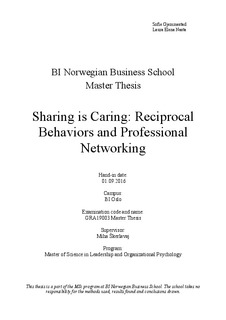Sharing is Caring: Reciprocal Behaviors and Professional Networking
Master thesis
Permanent lenke
http://hdl.handle.net/11250/2444114Utgivelsesdato
2016Metadata
Vis full innførselSamlinger
- Master of Science [1621]
Sammendrag
The purpose of this study is to contribute to the existing literature regarding the
interactions between individuals in a professional context, as a factor for their
success. First, this study sheds light on the newly developed typology of
reciprocity styles established by Grant (2013), containing three interactional
categories called givers, matchers and takers. By using Wolff and Moser’s (2009)
networking measurement, the study explores whether giving, matching and taking
behaviors are relevant when explaining the structural and functional differences in
professional networking (building, maintaining, and using contacts inside and
outside the organization). In addition, this study builds on the findings in the field
of social psychology, which have proven that people build the most collaborative
and longest-lasting connections when they work together on tasks. It thus, tests,
whether task interdependence can strengthen the relationship between giving,
matching, and taking behaviors and professional networking.
This study employed a quantitative cross-lagged research design. The
analysis of 385 participants showed that there is a relationship between giving and
taking behaviors and professional networking. Giving behavior correlated
positively to building internal contacts, maintaining internal contacts, and using
external contacts. Taking behavior correlated negatively to maintaining internal
contacts, building external contacts and using external contacts. Last, the findings
indicate that task interdependence moderated the relationship between giving and taking behaviors and professional networking.
Keywords: giving behavior, matching behavior, taking behavior, professional networking, and task interdependence
Beskrivelse
Masteroppgave(MSc) in Master of Science in Leadership and Organizational Psychology - Handelshøyskolen BI, 2016
